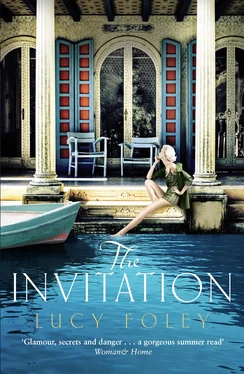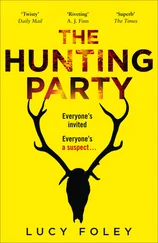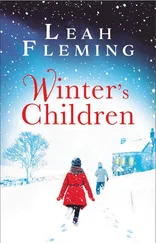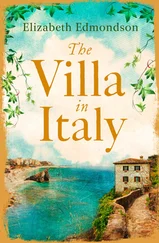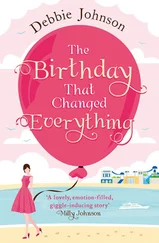‘OK.’
‘Good.’
She doesn’t know anything about me, he thinks, and yet she is coming with me, a complete stranger, into the night of a foreign city.
‘Do you need to tell anyone?’ he asks her, remembering the we .
‘No,’ she says, ‘I’m alone.’
They make their way back down the steps and into the warm fog of cigarette smoke, the press of bodies. She attracts admiring glances, he notices, from both the men and women.
Near the door, his eyes meet the Contessa’s. He thinks he sees her look quickly to Stella and then back again. For a moment she frowns, as if working something out. And then she turns back to her companion.
*
Outside in the street her pale head and outfit glitter through the darkness as though summoning all of the light to them. She shields her face with one hand as the headlamps of a passing car strafe across her. The driver, a man, cranes for a view of her through the window. His look is greedy and Hal feels something close to hatred for him, this complete stranger.
She turns to him, awaiting his move. Suddenly he fears that nothing he can come up with will be enough.
They walk through the Forum, the dark stones standing sentinel. He points out the remains of the Temple of Saturn, of which only the ribs of the front portico remain. The Basilica Julia. He shows her – he is thankful for the moonlight that allows it – the detail that has always fascinated him more than anything else: the marks where the bored audiences of the trials held there had scratched games into the stone. She has seemed interested by it all, but suddenly he sees her shiver, pulling her wrap around herself.
‘You’re cold?’
‘No.’ She glances across at him. ‘Do you mind if we go somewhere else?’
‘Of course – why? Don’t you like it?’
‘Yes – no. I do, but this quiet … it does something to you.’ She takes a cigarette from a tin in her little reticule, and her lighter, and he sees that her fingers are trembling as she tries to trip the flame into life.
‘Here.’ He takes it from her and does it himself.
‘Thanks.’
‘Where do you want to go?’
‘I don’t mind. Somewhere – different.’
He takes her to a bar he knows, in a certain secret square. The place is full, even at this hour. She steps before him into the warmth of the place. As he follows he sees the glances of the other customers: lecherous, envious, reverential. With her outfit and her pale blonde hair she could be a movie star. But not a Monroe. There is something less immediate, more foreign about her appeal.
As soon as she has seated herself one of the waiters is hovering, ready to take her order.
‘What are you having?’ she asks.
‘Oh, I thought I’d have a beer. But please, have anything you’d like.’ If he has the cheap beer, he thinks, he can afford to buy her a couple of the more expensive offerings. But, to his surprise, she says: ‘I’ll have the same as you.’
In the corner, a small jazz trio – double bass, sax, trumpet – are playing a number so rough and fervent that one can feel the vibrations of it in one’s chest. He watches her as she listens, her head on one side, her eyes half-closed.
When the beers arrive, the sight of her sipping hers, sitting in her finery, with that diamond bracelet about her wrist, is so incongruous that it makes him smile. She looks at him, venturing a smile of her own.
‘What is it?’
‘You look as though you should be drinking champagne.’
‘I hate it,’ she says. ‘I never learned to like it.’ She takes another sip. ‘I like this, though.’
‘Good. It’s Italian. I always have it here.’ He doesn’t say: because it is the only one I can afford .
‘How long have you lived in Rome? For a while?’
‘Yes,’ he says. ‘For a few years.’
‘And where were you before?’
‘London.’
‘Ah. And why did you come to Rome?’
What was it the Contessa had said? There is always something more . . . love, escape, the hope of a new life .
‘I came here to write,’ he says, and is immediately surprised at himself. He hasn’t admitted this to anyone, not even Fede. Why did he say it, and to a stranger? But perhaps it is the very fact that she is a stranger.
‘Write what?’
‘A novel, I suppose.’ Next he will have to admit that he hasn’t written anything beyond the first paragraph. He must deflect attention from himself. ‘And you,’ he says quickly, ‘you’re here on holiday?’
‘Yes.’ He waits for an elaboration: how long she is visiting, where she is staying, who she is staying with – he remembers the ‘we’. He has learned this – that if you wait long enough, the interviewee will feel uncomfortable or bored enough to fill the gap. But she says nothing. She is a little too good at this game, he thinks. All he knows of her is her first name, and her nationality. And there is a question over even that, because there is that accent, that slippage revealing some foreign note beneath.
‘Where is home?’ he asks.
‘Home?’ She looks thrown, for a second.
‘Yes. Where do you come from?’
Funny, but the question seems to give her pause. It fits, he thinks, with his idea of some ethereal creature who comes from nowhere and might vanish back into the darkness in a moment. ‘I live in New York,’ she says.
‘And is this your first visit to Europe?’
‘Oh, no. But I haven’t—’ he sees her catch herself. Then, slowly, as if carefully choosing her words: ‘I haven’t travelled to Europe for a while.’
The war, he thinks, probably. It has taken a while for Americans to start coming back.
She takes another sip, and as she does he sees something he had not noticed before. It gives him a shock. On her left hand, two of the fingers are completely missing: the smallest and the ring. The trauma is clearly an old one, the skin healed over the knuckles, but ridged with scar tissue. It is a strange thing, this violent absence, because she seems to him so complete and unblemished. Without warning she puts down the bottle and catches him looking.
‘An accident,’ she says, ‘when I was a child.’
‘Did it hurt?’
‘Do you know,’ she says, ‘I don’t actually remember.’
She does, he thinks, watching her. And it did hurt a great deal. Now, as never before, he understands Fede’s curiosity about his own background. The reticence is tantalizing.
Now she is checking her watch, and he guesses what is coming next. ‘It’s getting late,’ she says.
‘I haven’t shown you the garden,’ he says, before she can say that she needs to leave. He has no idea what he is going to show her, now. But this doesn’t matter. The important thing is that she stays. That the evening, the strange enchantment of it, is prolonged. The thought of his apartment, dark and empty, is suddenly more than unappealing – it is something almost fearful.
To his relief, she agrees. He shows her the entrance to the garden, a slender door in an unremarkable wall of old brick. Fede told him about this place. No one knows who it belongs to, he explained, or who cares for it. So few people know of it that it is a true sanctuary.
There are clementine and orange trees growing here, now burdened with ripe fruit. Among them are statues: putti, faceless goddesses wound about with ivy: some so enmeshed in it that they look half-consumed by it. And then on the wall behind them the really special thing. A gorgeous fresco of fruit trees, like a reflection of the garden itself, and pale nightingales and a sky of midnight blue. Only a few of the details are visible in the moonlight, but he hears her catch her breath at the sight. He thinks, suddenly, that he would like to take her here in the daytime, so that she can see the colours. The background is a blue that looks particularly antique, not of the modern world, a colour lost to time. Fede claims that the painting is a Roman original. It could be ancient, it looks it. But it could be a medieval imitation and still be older than the relics of many cities.
Читать дальше
